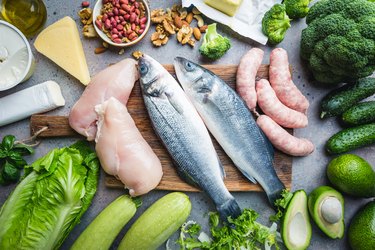
Carbohydrates and protein are both essential macronutrients that the body requires to sustain energy and health. Still, the battle of carbs vs. protein for muscle gain continues.
With carbs getting so much flak, it wouldn't be surprising if you didn't give them much credit in your muscle-building routine. But you just might be surprised at how much they can impact you bulking up process.
Video of the Day
Video of the Day
Tip
Carbohydrates provide the glycogen your body needs to do the resistance training required for muscle mass gains. While protein does provide some of the building blocks, carbs enhance this process. So one isn't better than the other; rather, they're both imperative for muscle growth.
Carbs and Protein Review
A balanced diet that includes the recommended daily intakes of these carbs and protein for your body type, in addition to strength training, improves your chances of building muscle mass. Because carbs and protein play different roles in muscle production, the most efficient gains occur when you have enough of both in your diet. So, don't focus on just one or the other; keep your diet balanced.
And always consult your physician before beginning any new nutrition regimen.
Carbohydrates for Muscle Energy
MedlinePlus notes that carbohydrates play a crucial role in supplying your muscles with their primary source of energy in the form of glucose. After you eat a carbohydrate-containing food, your digestive system breaks it down and distributes the resulting glucose, via the bloodstream, to your tissues, organs and muscles. You either use glucose quickly, based on your body's requirements or store it in the liver and skeletal muscles as glycogen to use later.
During exercise, your body is more likely to tap into the glycogen storage, but if your body doesn't need additional carbohydrate energy, it doesn't dip into the supply. Whether your body has readily available glucose or needs to dip into your glycogen stores, it requires energy to be able to work out. And a diet high in carbs can help to build muscle and burn fat while providing that energy.
Role of Protein
Protein is a source of fuel to the muscles, but its more significant role is as the basic building block of cells, which build or repair tissue and muscle. Chains of small molecules, called amino acids, are the building blocks of protein. Your body creates non-essential amino acids but must get another form of these molecules, called essential amino acids, from animal-based foods that contain protein.
Because of protein's primary role as a building block, it generally doesn't serve as a muscular energy source unless your body doesn't have enough carbohydrate, or glucose, readily available. So, while protein supplies the materials to help build your muscles, carbs are more important than protein for building muscle because of the workout energy they provide you.
Read more: How Much Protein is Right for You?
Building Muscle Mass
Although protein is critical in building and maintaining muscle, ingesting more than your body can use doesn't lead to larger or stronger muscles, according to the U.S. Anti-Doping Agency. You can improve your chances of building muscle mass by eating a well-balanced diet, including low-fat sources of carbs and protein.
Consuming carbs two to four hours before exercise will optimize glycogen stores, or muscle energy according to a study in the May 2014 issue of Nutrients. A study from the February 2018 issue of Journal of the International Society of Sports Nutrition recommends consuming a healthy protein source before and after a workout to promote muscle synthesis and repair. You may enjoy a smoothie filled with high protein fruits for muscle building and nutrient replenishing.
Additional Considerations
Simply consuming a healthy diet with protein and carbs won't build muscle mass. Participating in muscle-strengthening activities is necessary for your muscles to use energy and to synthesize new muscle growth. Resistance training, weightlifting, or a combination of weights and cardiovascular exercises improve your body's ability to gain muscle mass, according to a study in the April 2016 issue of International Journal of Exercise Science.
- United State Anti-Doping Agency: Optimal Dietary Intake Guide
- Harvard Health Publishing: “Carbohydrates — Good or Bad for You?”
- Medline Plus: “Carbohydrates”
- Harvard Medical School: “Healthy Mind, Healthy Body: Benefits of Exercise”
- Nutrients: “Pre-Exercise Nutrition: The Role of Macronutrients, Modified Starches and Supplements on Metabolism and Endurance Performance”
- National Institute on Aging: “Important Nutrients to Know: Proteins, Carbohydrates, and Fats”
- Journal of the International Society of Sports Nutrition: "How Much Protein Can the Body Use in a Single Meal for Muscle-Building? Implications for Daily Protein Distribution"
- Medline Plus: “Protein in Diet”
- Better Health Channel: “Protein”
- International Journal of Exercise Science: “Increasing Lean Mass and Strength: A Comparison of High Frequency Strength Training to Lower Frequency Strength Training”
- University of Maryland Medical System: Carbohydrate Calculator
- Appalachian State University: Protein: Building Block of a Power House